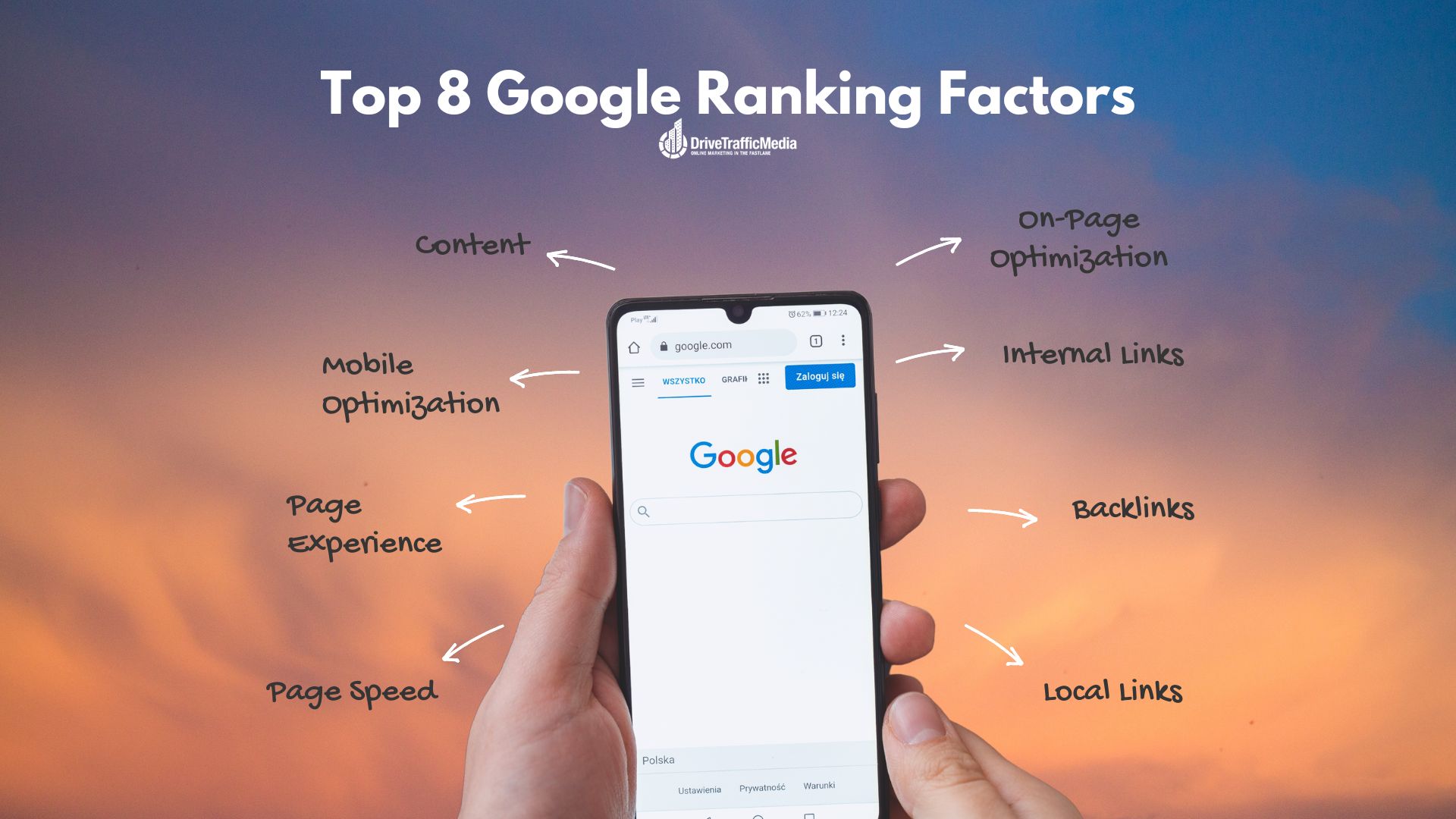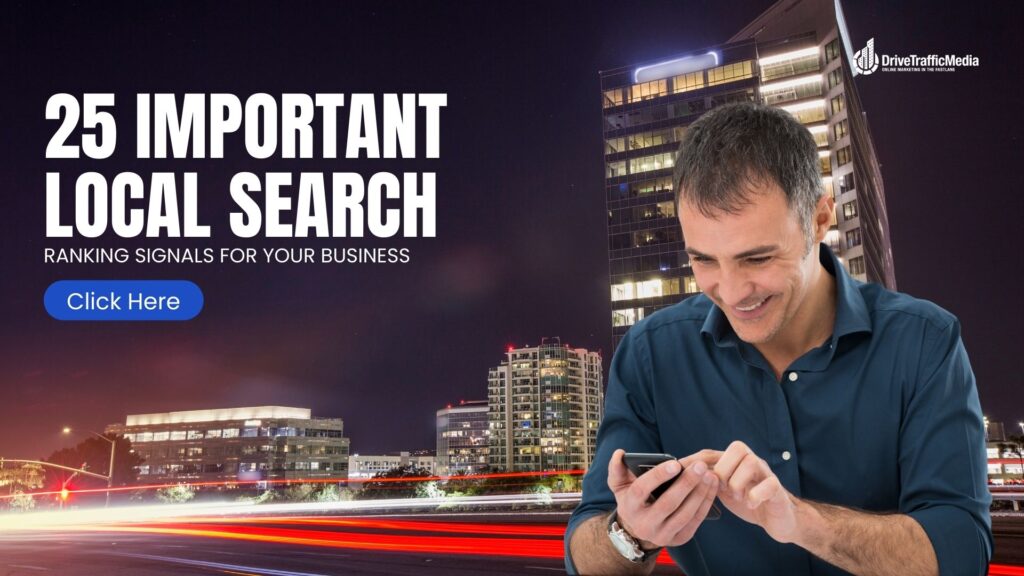To those unfamiliar with SEO, it might look a lot like mumbo-jumbo. With all this stuff about website design, keyword research, social media marketing, schema markups, and other kinds of jargon, you just can’t be too sure about what is good or bad in SEO. It feels like just about anything can have you rise or fall in the search rankings.
In addition to that, Google posts updates regularly. What was accepted a few years ago might be to your detriment the next. You’re always on your toes with this hot and cold relationship with Google, making it more difficult to run your website.
However, while things come and go constantly in the SEO world, some things stay the same. If you master these things, your website can progress no matter what kind of curveball the Internet throws at you.
Let’s take a look at the top 8 ranking factors on Google.
Content
When it comes to search engine optimization, high-quality, well-written content reigns supreme. This content not only needs to answer a searcher’s questions but also has to provide other valuable information they might be interested in. It needs to understand the reader on a deeper level—understanding why the searcher asked that query is just as important as answering the query itself.
Content also has to have great keywords. You can’t be found on the search engines if your content doesn’t have the keywords searchers are looking for! Every website needs to have a list of keywords they want to be found for, and that can be accomplished by doing keyword research. Use tools like Moz Keyword Research and SEMrush to help you with that.
Mobile Optimization
Many of today’s web searches are done on mobile devices, and Google responded to this fact by releasing the mobile-first indexing update. Nowadays, Google uses mobile-friendly versions to index websites on the search engines. While a website doesn’t necessarily have to have a mobile-friendly version, it does affect a user’s experience in the long run, which is usually why mobile-friendly websites tend to rank higher than those that don’t.
Mobile usage will only grow exponentially from here. You must adapt to mobile-friendliness before it’s too late to save your search rankings.
Page Experience
Did you know that 38% of readers click out of a website if it’s unattractive? You need to make sure everything about your website is primed for your customers, as even the tiniest mistake can cost you.
The things you need to consider with page experience are architecture, web vitals, site security, and ads.
Architecture refers to your site’s aesthetics. It needs to be easy on the eyes and organized at the same time. Users should be able to find whatever they’re looking for in a flash—you don’t want them to spend more than three or four clicks trying to find what they’re looking for.
Web vitals, on the other hand, are the most basic things you need to accomplish on your website. They are quantifiable measures that determine your user’s overall experience. These include loading speed, interactivity, and visual stability.
Site security, as the name suggests, is how secure your site is for both you and your readers. With privacy concerns being more rampant lately, readers want to know their data isn’t being breached by simply being on your website. Even a simple switch from HTTP to HTTPS can improve your site a lot.
Lastly, ads refer to the number of them on your website. While having ads can help your website stay afloat, you need to make sure they’re not ruining things for your readers. Not only will it ruin your user’s site experience, but it can also land you in hot water with Google—they now actively sanction those who go against the Better Ads Standards. Extra revenue from your ads isn’t worth that.
Page Speed
One of the most annoying things to experience on the Internet is slow loading speed. Even one or two seconds of waiting can deter someone from visiting your website—for example; Amazon estimates that it could lose out on a whopping $1.6 billion in sales if it loaded one second later!
There are many reasons why a page could low slowly. There might be too many large, uncompressed images; there are too many HTTP redirects; there are too many CSS and JavaScript elements… whatever the case is, it can be costly.
On-Page Optimization
Your content shouldn’t be the only thing optimized for search engines. All other page elements, such as your meta description, headers, alt tags, schema, and even featured snippets, should be too. These help search engines find your website better.
Meta descriptions, featured snippets, and alt tags are things people see when they discover you on search engines. They tell them what your page is about even before they click on your website. For that reason alone, you need to optimize them well. Like how people judge books by their covers, people judge websites by their meta descriptions, featured snippets, and alt tags!
Schema and headers, on the other hand, are for those who visited your website but want to know things in an instant. Schema helps Google figure out the page’s content without skimming the whole thing, while headers help readers do the same thing.
Internal Links
You should think about internal linking as creating a map of your website. You hand this map over to search engines and users so they can easily navigate through your website.
Obviously, you wouldn’t want them to end up in the middle of nowhere. You’ll want to show the most fundamental parts of your website first. With internal linking, you can put strategically-placed links all over the website leading to these important pages.
With this map, you’ll also want to direct traffic. For example, if you’re an e-commerce website and want to lead your customers down the marketing funnel, you’ll want to show them pages in a particular order. Internal linking helps by showing readers the next logical step on your website.
Lastly, you don’t want readers jumping from one topic to the other. That gets tiring quickly, especially if your customers aren’t interested in some topics. You want to utilize internal linking by grouping similar topics together so customers can easily find the next thing they want to read.
Backlinks
Backlinking is the best way to boost your relevance and authority in search engine rankings. Each backlink you earn is essentially an endorsement from other websites, especially if they’re just as or more authoritative than yours. This lets search engines know that your website is worth reading.
Additionally, building backlinks with other websites opens the door for prospective customers from other websites. Adding your company details to an online resources site like Yelp, for example, lets Yelp users find you when they search for your services. Having an influencer recommend you on their website also lets their readers find you if they’re interested.
Local Links
Promoting your business to locals should be your #1 priority, as locals in your area are your likeliest customers. On your website, you always need to emphasize where your locations are so Google can easily pull you up when searchers look for your services.
Google measures your “localness” through three key factors: relevance, distance, and prominence. Relevance refers to how connected your business is to the searcher’s query. For example, Google isn’t going to recommend you a Japanese restaurant if you search for an Italian restaurant in your area. Distance, on the other hand, is how far your business is from the searcher—the farther you are, the less likely Google will recommend you. Lastly, prominence refers to your reputation—the better and more positive your reviews, the more prominent you are.
Conclusion
SEO is like a recipe—Google’s ranking factors are the ingredients, while your efforts and hustle are the instructions. You need to do both amazingly for your website to turn out… amazing!
Of course, if you’re far too busy to deal with the complications of SEO, then you could always assign that task to someone more knowledgeable. Drive Traffic Media is an SEO expert in Orange County that can help you with that. Not only do we have experience in SEO, but we also provide services in website design, social media marketing, design and editing, and so much more!
Contact us today at (949) 800-6990 for a free consultation.
Check the related article here:

